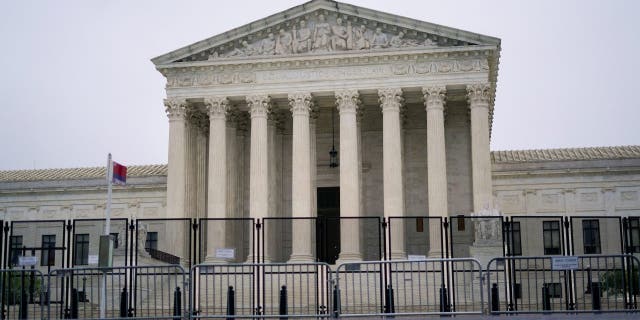The Supreme Court leaker must pay
The leaker has to face real consequences
Nearly two weeks after Politico published Justice Samuel Alito’s draft majority opinion in the term’s big abortion case, we still don’t know who the leaker is. That’s unfortunate, to say the least, not because our tabloid curiosity hasn’t been satisfied but because this is the most serious threat to the Supreme Court’s integrity in living memory.
The leaker must be found to avoid setting the precedent that decision drafts can be leaked with impunity to influence case outcomes, which would threaten public confidence in the Court at a time when societal trust is already low. It’s one thing to disagree with a ruling, quite another to facilitate real-time critiques of judicial decision-making. If chambers confidences can’t be kept, the judiciary will cease to function as an independent institution.

Security fencing is in place outside the Supreme Court in Washington, Saturday, May 14, 2022, ahead of expected abortion right rallies later in the day. (Photo/Pablo Martinez Monsivais)
And that means that the leaker, whoever it is and whatever the motive, has to face real consequences. Although it’s unclear whether this person could face criminal prosecution—short of the scenario of a computer hack (unlikely given that the leak came with information about the justices’ initial and continuing voting stances)—this offense should be treated as a career-killer. That holds true whether the leaker is a clerk, secretary, chambers aide, or even a justice.
The most likely scenario is that it’s a clerk, one of the three dozen wunderkinds who do the heavy lifting of legal research for the justices. There’s been plenty of speculation about whether it would be someone on the left or the right—the former is more likely, though it was irresponsible to name and shame current clerks without any evidence, as some amateur Twitter detectives have done—but that’s irrelevant to the ramifications. As one former clerk reported Justice Antonin Scalia having said, "If I ever discover that you have betrayed the confidences of what goes on in these chambers, I will do everything in my power to ruin your career."
To wit, this budding lawyer should face disbarment or, if not yet a member of the bar, preemptive disqualification during the "character and fitness" portion of the bar-admission process. Lawyers have been disbarred for far less.
The leaker is no naïf and will likely have decided that this risk was worth the chance to blow up the deliberative process. The leaker may have correctly calculated that giving up the ability to practice law—and even a $400,000 big-firm signing bonus—was a small price to pay for becoming a progressive hero. Indeed, this person would be well-positioned for a cozy sinecure at a prominent institution of left-wing advocacy like MSNBC, CNN, or Yale Law School. But a lucrative career as a partisan hack is reputationally different than one as a serious and high-minded officer of the court.
What if it’s not a clerk? Non-clerk staff are likely to be less ideological and have more of an interest in keeping their jobs than a one-year clerk. They’re also likely to have more loyalty to their justice or the Court. And they’re probably not aspiring to be public intellectuals or activists, so it’s unclear why they’d risk getting fired and blackballed from similar employment, which is what the consequences would be for them.
The leaker could be the spouse or friend of a clerk, but it’s hard to think of how this person would accomplish a leak—particularly of the justices’ preliminary votes, and the follow-up leak that there aren’t any further opinions in circulation—without the clerk’s complicity.
Could it be a justice? It’s highly unlikely, because all nine have too strong an interest in maintaining confidentiality and the legitimacy of the Court as an institution. Indeed, recent reporting suggests that justices across the ideological map are "uniform" in decrying the leak. But if it were to be a justice, who at this point would be gaslighting his or her colleagues, then it’s no exaggeration to suggest that impeachment is appropriate.
As we’ve rediscovered in recent years, impeachments are highly political affairs, with a political judgment about whether the given offense rises to the level of a "high crime and misdemeanor." In our history, the House of Representatives has approved articles of impeachment against judges 15 times, including once against a Supreme Court justice, Samuel Chase, who in 1804 was charged with political bias, arbitrary rulings, and generally promoting a partisan agenda on the bench. Chase was acquitted, but eight jurists were convicted and removed, for offenses ranging from public drunkenness and supporting the Confederacy to corruption, tax evasion, and perjury. Only one Democrat senator, Mark Warner, has thus far condemned the Dobbs leak, so there may not be political will in the Senate to convict, but that doesn’t mean it would not be worth pursuing given the gravity of the matter.
Finally, lest anyone accuse me of propagating cancel culture by calling for professional punishment here, let me emphasize that the offense is not some politically incorrect statement but rather an action that damages the Supreme Court’s functioning and thus the rule of law. Whoever did this must pay for putting another tear into the parchment barrier keeping us from tyranny.
Ilya Shapiro is executive director of the Georgetown Center for the Constitution and senior lecturer at the Georgetown University Law Center.
